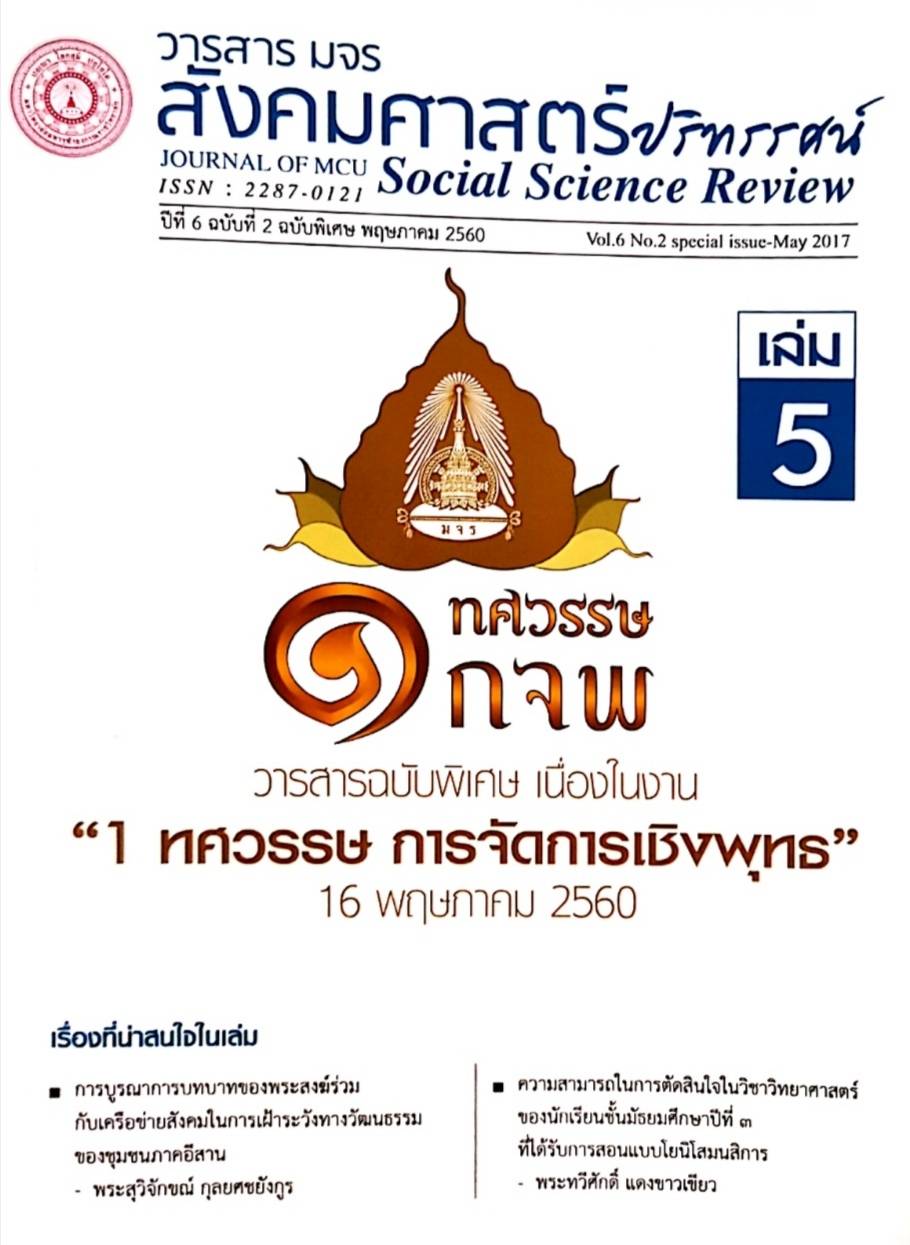กระบวนการพัฒนาทักษะความเป็นพลเมือง ตามระบอบประชาธิปไตยสำหรับนักศึกษามหาวิทยาลัย
คำสำคัญ:
ทักษะความเป็นพลเมืองตามระบอบประชาธิปไตย, นักศึกษามหาวิทยาลัยบทคัดย่อ
การวิจัยครั้งนี้มีวัตถุประสงค์เพื่อศึกษาและพัฒนากระบวนการพัฒนาความเป็นพลเมืองตามระบอบประชาธิปไตยสำหรับนักศึกษามหาวิทยาลัย วิธีดำเนินการวิจัย ใช้การวิจัยและพัฒนา กลุ่ม ได้แก่ นักศึกษามหาวิทยาลัยราชภัฏ 84 คน
ผลการวิจัยพบว่า 1. สภาพปัจจุบันนักศึกษามหาวิทยาลัยราชภัฏสกลนครทั้ง 6 คณะมีความเป็นพลเมืองอยู่ในระดับมาก
2. กระบวนการพัฒนาทักษะความเป็นพลเมืองตามระบอบประชาธิปไตยสำหรับนักศึกษามหาวิทยาลัยที่เหมาะสมได้แก่ การเรียนรู้แบบลงมือปฏิบัติ (Active Leaning) ซึ่งประกอบด้วย 4 ขั้นตอน ได้แก่ ขั้นการเตรียมการ (P) ขั้นการนำไปปฏิบัติ (A) ขั้นการสะท้อนประสบการณ์ (R) ขั้นการประเมินผล (E) หรือเรียกว่า P.A.R.E. Process
3. ผลการนำกระบวนการเรียนรู้แบบลงมือปฏิบัติไปใช้กับนักศึกษามหาวิทยาลัยจำนวน 84 คน พบว่า คะแนนทักษะความเป็นพลเมืองตามระบอบประชาธิปไตยของนักศึกษาที่เข้าร่วมกระบวนการเรียนรู้แบบลงมือปฏิบัติมากกว่านักศึกษาที่ไม่ได้เข้าร่วมอย่างมีนัยสำคัญทางสถิติที่ระดับ .01 นอกจากนี้ยังพบว่าองค์ประกอบที่สำคัญของการพัฒนาความเป็นพลเมืองตามระบอบประชาธิปไตยสำหรับนักศึกษามหาวิทยาลัยคือ ทักษะการคิด การเคารพกติกา การเคารพสิทธิผู้อื่น ความรับผิดชอบต่อสังคม การมีส่วนร่วมในกิจกรรมสาธารณะ เคารพความแตกต่างและรับผิดชอบต่อสังคมร่วมกัน
ดังนั้นการเสริมสร้างความเป็นพลเมืองตามระบอบประชาธิปไตยสำหรับนักศึกษามหาวิทยาลัยควรใช้กระบวนการเรียนรู้แบบลงมือปฏิบัติ, การเรียนรู้โดยใช้โครงการเป็นฐาน, การเรียนรู้โดยใช้ปัญหาเป็นฐาน และใช้กลยุทธ์ "สอนน้อยลงแต่เรียนรู้มากขึ้น (teach less and learn more)
เอกสารอ้างอิง
วรากรณ์ สามโกเศศ. (2554). การศึกษาเพื่อสร้างความเป็นพลเมือง. มติชน ฉบับวันที่ 3 มี.ค. 2554(กรอบบ่าย) สืบค้นจาก http://www.moe.go.th/moe/th/news/detail.php?
NewsID=22721&key=news_research. สืบค้นเมื่อวันที่ 26 กันยายน 2558).
สัญญาศรณ์ สวัสดิ์ไธสง และคณะ. (2557). การจัดการเรียนรู้แบบรับใช้สังคมเพื่อพัฒนาทักษะ ความเป็นพลเมืองของนักศึกษามหาวิทยาลัยราชภัฏสกลนคร. สนับสนุนทุนวิจัยโดย สำนักบริหารโครงการส่งเสริมการวิจัยในอุดมศึกษาและพัฒนาการวิจัยมหาวิทยาลัย แห่งชาติ สำนักงานคณะกรรมการการอุดมศึกษา.
อเนก เหล่าธรรมทัศน์. (2556). การเมืองของพลเมืองสู่สหัสวรรษใหม่. (พิมพ์ครั้งที่ 6).กรุงเทพฯ : โครงการจัดพิมพ์คบไฟ / มูลนิธิเพื่อการศึกษาประชาธิปไตยและการพัฒนา.
อานันท์ ปัญญารชุน. (2551). ปาฐกถาเรื่อง Sustainable Democracy. สืบค้นจาก http://www2.thaiembassy.be/th สืบค้นเมื่อวันที่ 25 มิถุนายน 2557).
Abowitz & Harnish. (2006). Contemporary Discourses of Citizenship, in Review of Educational Research 2006. Felder R.M. and Brent, R. "Active Learning: An Introduction." สืบค้นจาก https://social.crru.ac.th/activeLearning. สืบค้นเมื่อ วันที่ 25 กันยายน 2558.
Kahne, Joseph and Westheimer. (2004) Joel, What Kind of citizen? The politics of educating for democracy, in American Educational Research Journal, volume 41 N. 2, Summer 2004.
Yamane, Taro. (1973). Statistics: An Introductory Analysis. Tokyo: Heaper
International Edition.
ดาวน์โหลด
เผยแพร่แล้ว
รูปแบบการอ้างอิง
ฉบับ
ประเภทบทความ
สัญญาอนุญาต
ลิขสิทธิ์ (c) 2020 วารสาร มจร สังคมศาสตร์ปริทรรศน์

อนุญาตภายใต้เงื่อนไข Creative Commons Attribution-NonCommercial-NoDerivatives 4.0 International License.
เพื่อให้เป็นไปตามกฎหมายลิขสิทธิ์ ผู้นิพนธ์ทุกท่านต้องลงลายมือชื่อในแบบฟอร์มใบมอบลิขสิทธิ์บทความให้แก่วารสารฯ พร้อมกับบทความต้นฉบับที่ได้แก้ไขครั้งสุดท้าย นอกจากนี้ ผู้นิพนธ์ทุกท่านต้องยืนยันว่าบทความต้นฉบับที่ส่งมาตีพิมพ์นั้น ได้ส่งมาตีพิมพ์เฉพาะในวารสาร มจร สังคมศาสตร์ปริทรรศน์ เพียงแห่งเดียวเท่านั้น หากมีการใช้ภาพหรือตารางหรือเนื้อหาอื่นๆ ของผู้นิพนธ์อื่นที่ปรากฏในสิ่งตีพิมพ์อื่นมาแล้ว ผู้นิพนธ์ต้องขออนุญาตเจ้าของลิขสิทธิ์ก่อน พร้อมทั้งแสดงหนังสือที่ได้รับการยินยอมต่อบรรณาธิการ ก่อนที่บทความจะได้รับการตีพิมพ์ หากไม่เป็นไปตามข้อกำหนดเบื้องต้น ทางวารสารจะถอดบทความของท่านออกโดยไม่มีข้อยกเว้นใดๆ ทั้งสิ้น





